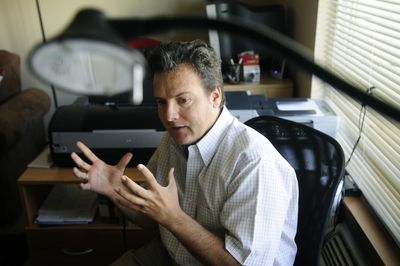Camilo Madero

Camilo Madero came to Spokane for the most typical of reasons.
“It’s the ideal place to raise a family,” said the 40-year-old architect, who lived most of his life in Bogota, Colombia, and San Juan, Puerto Rico. “It’s very quiet. It’s a small city. … Big cities are very nice, but they have pros and cons.”
Madero is among one of Spokane’s fastest-growing demographic groups – people with Hispanic roots. The Hispanic population in Spokane County grew by 47 percent in the last eight years, though it makes up just 3.7 percent of the population.
Born in the U.S. to Colombian parents, Madero lived outside the country until a year ago, when he moved to Spokane with his wife and 6-year-old daughter. In March, he started his own business designing and building “green” homes, Global Enterprises. The company is already working on a home in the Five Mile area and is adding clients.
His partner, Ivan Kriger, is a native of Kyrgyzstan. Kriger is part of another big piece of Spokane’s cultural landscape – estimates indicate that the population of people from Russia, Ukraine and other Eastern European countries in the Spokane area is about 25,000, larger than any racial minority category tracked by the Census.
Still, Madero was taken aback initially by the lack of diversity here.
“You don’t see many African-Americans in your everyday life,” he said. “So that has been a shock for me. Coming from San Juan, you come across African-Americans all the time. Here, almost no one.”
Madero said he finds most people accepting, yet there are inevitably moments of cultural collision – often surrounding the issue of his accent. Like other Hispanics, he said that he often encounters anger over issues of communication and language.
“The other day I was talking on the phone … and the guy told me, ‘You know what, I don’t understand what you are saying – Bye,’ ” he said. “And the guy hung up on me.”
At the drive-through, “most of the time, you don’t get what you order,” he said. “They just hear that you have an accent, and they don’t make an effort to get things right.”
He said there is a stereotype of Latin people that he tries to avoid.
“A lot of people generalize,” he said. “They say, ‘Oh, this guy is Latin. He’s here to live from the government and to not pay taxes and to fill our schools and abuse the system.’ ”
Still, he considers those problems minor in the overall picture.
“This is exactly what we were looking for,” he said. “As time goes by, we are more convinced that we did the right thing.”